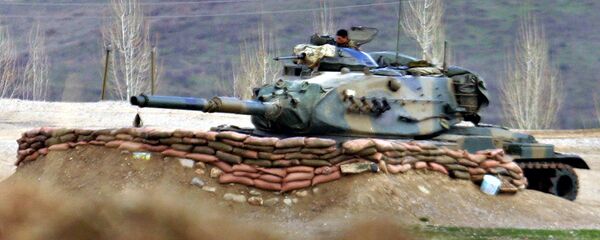"On Wednesday, an affiliate of the largest and most powerful Kurdish party in Syria, the Democratic Union Party (PYD), opened its first official mission abroad — in Moscow," the article read. "Given the amount of military and political support the PYD has received from the United States, this decision is likely to be received with some shock and confusion in the West."
However, Kurds’ historical experience and their core interests prove that cooperation with Moscow is of strategic importance for the PYD.
Kaplan outlined a list of arguments to explain why Kurds, one of the major forces in the fight against Daesh, are now pivoting from Washington toward Moscow.
First, according to the analyst, the US and Syrian Kurds were never allies to begin with.
"Kurds have a long and bitter history of abandonment by external allies, and no Kurdish player is likely to play all its cards on one option," he wrote.
One of the reasons for the US getting cold feet on cooperating with YPG is the fact that it is affiliated with the Kurdistan Workers’ Party (PKK), described as a terrorist organization by Ankara. Washington wants to avoid angering its larger NATO ally, Kaplan noted.
Second, it is likely that the PYD expects a more fruitful partnership with Moscow because its odds of maintaining ties with the West are becoming increasingly low, the article read.
"In fact, it was the Russians who pushed to have PYD representatives acknowledged in last week’s Geneva talks on Syria and the current assault on Aleppo is believed to have helped the YPG greatly," the analyst pointed out.
Furthermore, it is a fact that the US is "unpredictable" in its support for militant groups, and the Kurds are no exception.
Third, Kurds are leaning toward Russia because Moscow "has the most leverage and influence over Damascus in any post-conflict settlement." The Syrian Kurds may be maneuvering for their best chance during post-war settlement, the article read.
"As the PYD nears the consolidation of its territorial goals and no longer fears intra-insurgent competition, it is becoming free to focus its diplomatic attention on securing the best autonomy deal possible. These dynamics can help explain why nearly four months ago, the PYD increased its diplomatic attention to Moscow," Kaplan wrote.
"Putin is without a doubt Assad’s greatest international ally and thus has the most leverage to help secure Syrian Kurdish demands," he added. From a Syrian Kurdish perspective, the road to settlement with Assad and potential autonomy for Kurds in Syria lies through ties with Moscow and not Washington, the article concluded.





